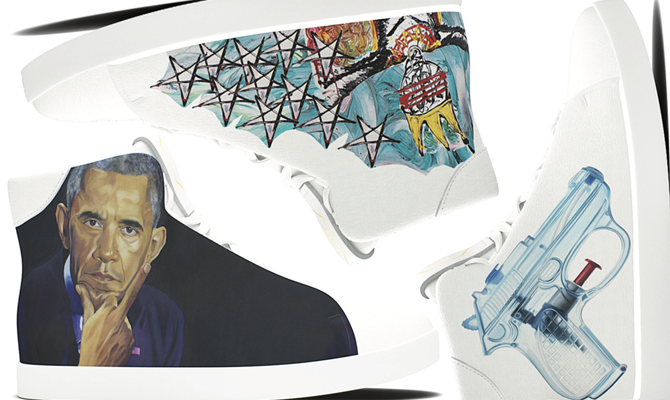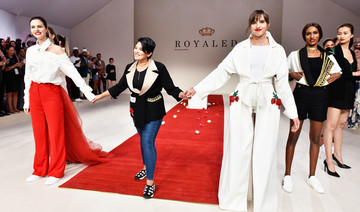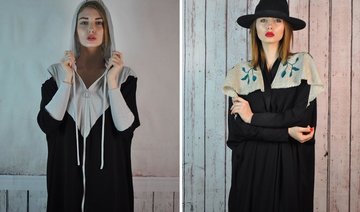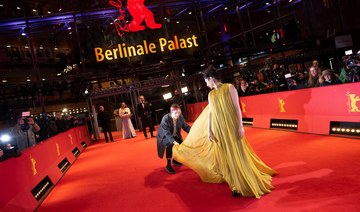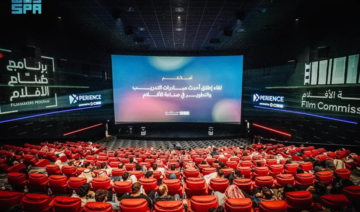DUBAI: A university project turned lifelong career is not what Riyadh-born Nour Al-Tamimi had in mind when she first stepped into the world of art.
But the 29-year-old designer has managed to do just that, breaking down the barriers between fashion and art with striking clothing designs. Now Al-Tamimi has created the Kingdom’s first sneaker brand, which “speaks the truth” by featuring striking and often thought-provoking artwork.
The Nou Project is anything but a traditional Saudi sneaker brand — the shoes are unisex. “That was the biggest thing for me, being Saudi,” Al-Tamimi said. “I was excited to come up with something that was unisex, something that Saudi men and women could wear as equals. People asked about creating flats or cute clutch bags — but I wanted to appeal to both sexes and have them find a common ground.”
Al-Tamimi’s artistic journey began at the School of the Museum of Fine Arts at Tufts in Boston, where she gained a bachelor of fine arts. Soon after, she was on her way to Milan, where she was awarded a master’s in fashion at the renowned Istituto Marangoni. Later, in Los Angeles, she pursued a master’s in art business at the Sotheby’s Institute of Art. “I was always into art and fashion,” Al-Tamimi said. “I ended up doing my last semester in New York City, where I got blisters from walking around in flat shoes or stilettos. That’s whenI realized I wanted to invest in a cool pair of sneakers for daily use.”

Riyadh-born Nour Al-Tamimi
As part of the course, Al-Tamimi had to develop a business plan for a project to benefit the art world. That was when her idea came to life. “I thought it would be cool to cater to sneaker-heads and art collectors,” she said. “I wanted to have really cool sneakers with limited art and to have art on a different platform. New York, as a city, was inspirational, and it became about combining my passion for art and fashion.”
Following her graduation, Al-Tamimi spent time at an art market website that collaborated with artists to produce furniture and other household items. “It was a valuable experience,” she said. “I decided to make my business plan a reality and I met my co-creative director Basma Chidiac in New York.”
Featuring pop and street art, Al-Tamimi’s leather shoes became an instant hit. One design features water pistols by artist James Rawson, whose work addresses issues of the past 50 years, including over-consumption and global inequality.
Another favorite and a bestseller for the Nou Project includes work by Eric Yahnker with his “AirObama Cares” — a portrait of former US president Barack Obama “giving the finger”. Yahnker used gouache, a paintbrush, colored pencils and a roll of watercolor paper to create what he calls “a crude gesture that many of us may wish he would use, but are grateful he doesn’t.” Although Al-Tamimi loved the idea, the gesture caused some doubts.
“I showed it to my mother, who asked how I could put that on a shoe and wondered what people would think or say,” she said. “But it became our bestseller, so it’s important to remember that art is all about things that are shocking. It’s about commenting on current affairs and pointing out issues.”
The designer received requests from customers in Miami suggesting an artwork of Trump blow-drying his hair. “Those shoes point to the value of art and art history,” she said.
One of Al-Tamimi’s favorite pieces is by fellow Saudi artist Rexchouk, who works out of a SoHo studio in New York and has been featured in the artist program of the Walton Fine Arts Gallery in London.
“I admired his courage and the way he never studied art but knew this was his passion and what he wanted to do,” she said. “It’s really nice to support each other as Saudis.
He is one of the artists who means a lot to me. But I love them all — I was really excited about our collaboration with the Untitled Art Fair in Miami last December because we did 55 pairs with three artists showcasing there.”
Although the journey has been challenging for Al-Tamimi since she started in 2015, it has been worthwhile. “I had no idea this would become my life today,” she said. “It’s exciting to be the first Saudi sneaker brand — that’s a milestone in itself.” The designer believes the opening of art galleries in both Riyadh and Jeddah will make it easier for aspiring Saudi artists to enter the market. “I’m so proud of all of them,” Al-Tamimi said.
“I would tell young Saudi women looking to start their own business to work with other startups as they encourage each other to grow. We are all in a creative industry, so helping each other out will help you to stay ahead of the game.”



